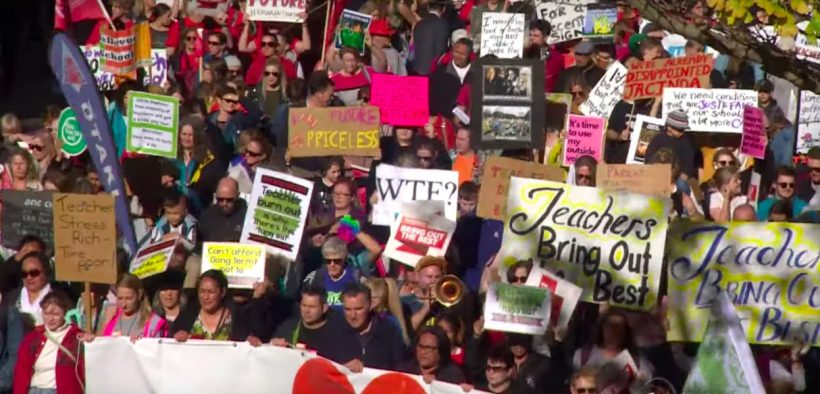50,000 Teachers Take Part in New Zealand’s Largest Education Strike

Unions say that low pay and lack of equity are significant contributors to the escalating teacher shortage and increasing class sizes.
(People’s Dispatch) As many as 50,000 teachers across New Zealand went on strike on May 29 to demand a pay hike and better working conditions. Members of education unions NZEI Te Riu Roa, which represents primary school teachers, and the Post Primary Teachers Association (PPTA), which represents secondary school teachers, voted to jointly call the strike when negotiations with the Ministry of Education reached a deadlock earlier this month. This will be the largest teachers’ strike the country has ever seen.
The teachers are demanding a pay increase of up to 15-16%. Apart from increased wages, they are also seeking reduced workload, and more classroom resources. The teachers are also calling on the government to devise long-term solutions to address increasing underemployment in the teaching sector. The average wage for primary school teachers is about USD 47,980 a year, which equates to about USD 23 an hour (USD 5.30 above the minimum wage).
Awesome turnout in Dunedin today #BackTheTeachers #KuaTaeTeWa #ItsTime pic.twitter.com/DZY7n4Othg
— NZEI Te Riu Roa (@NZEICampaigns) May 29, 2019
A joint strike has been in the works for almost a year now. The teachers have separately organized a few strikes over the last year but, for the most part, they have been ineffective. The unions have now joined forces because they believe this will allow them to put more pressure on the government, especially through parents who will have to take an off to look after their children during the strike.
In order to avoid the strike, the Ministry of Education, headed by Chris Hipkins, offered the unions a 1.2 billion deal which would have raised wages by 9% over the next three years. However, the teachers overwhelmingly rejected the offer, stating that it only provided a makeshift solution to the underemployment issue and failed to address their soaring workloads and the need for extra resources.
Ahead of the strike, a teacher from Auckland, Samantha McRae, said, “The offer is not enough.Yes, a pay rise would be great for anybody, but it’s still not going to help us address the need for decreased workloads and more resources. It’s not going to get more people into the job – or keep the teachers we currently have.”
New Zealand’s education sector has been reeling under a shortage of teachers and special educators. Nearly 52% of primary schools claim that they do not have enough applicants for their vacancies, and 28% have had to increase class sizes because of this, according to a survey by the NZ Educational Institute. This has pushed many schools to recruit teachers from abroad. Unions say that low pay and lack of equity are significant contributors to the escalating teacher shortage. They believe an increase in pay will not only incentivize employment in education but it will also ensure higher retention of presently employed teachers. However, a pay hike has to be accompanied by sustained investment in training and educating prospective educators, they argue.
The strike comes ahead of the government’s much-vaunted “Wellbeing Budget”, which is designed to prioritize welfare policies, especially in the areas of child poverty, homelessness, domestic violence and mental health. In the past, annual budgets have overlooked education but in the wake of widespread mass mobilizations by teachers, this year’s budget sees it as a top priority. In the week leading up to the budget, Hipkins announced that his ministry would invest nearly USD 95 million over four years in training teachers. Although the unions were pleased with this announcement, they believe that simply investing in training teachers will not resolve the teacher shortage, which is rooted in low wages and high workloads. They are hoping the strike will nudge the government to make more comprehensive provisions in the upcoming budget.
The strike has received sweeping support from the public, especially parents, many of whom intend to join the teachers. “I think teachers deserve more than what they’re getting. It is an inconvenience for parents having to organize staying at home with the kids but I think teachers deserve to fight for what they want,” said one parent.















